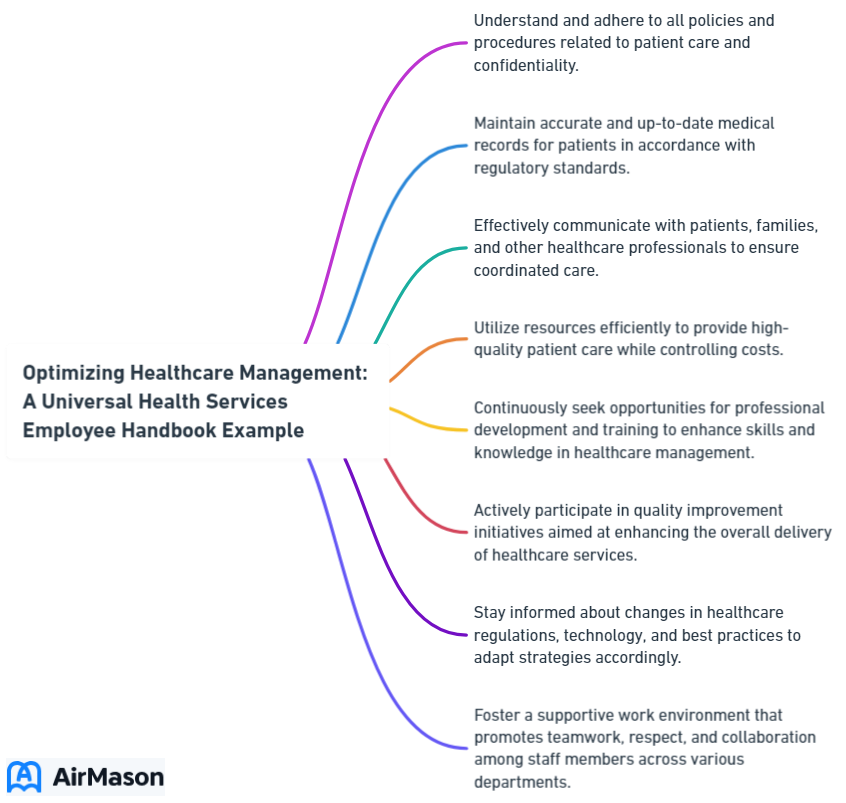
If you are exploring what a sample ‘universal health services employee handbook example’ might look like, you’re in the right place. This article cuts through the fluff and dives straight into the key sections and rules employees at Universal Health Services can expect to navigate—from code of conduct to benefits, safety measures, and more—providing a clear framework for what a comprehensive employee handbook should encompass.
Key Takeaways
- The Universal Health Services employee handbook is an essential document establishing the organization’s mission, values, comprehensive policies, and guidelines for fostering clear communication, ensuring legal compliance, and providing a reference for employees to navigate the healthcare environment.
- Universal Health Services implements core policies including patient care standards, ethical conduct, and workplace safety, with strict adherence to regulations such as those from The Joint Commission (TJC) and the Occupational Safety and Health Act (OSH Act) to ensure high standards of healthcare services and a secure work environment.
- To adapt to the digital age in healthcare, Universal Health Services has integrated Electronic Medical Records (EMRs), telemedicine services, and robust cybersecurity measures that ensure efficient, accessible care delivery and the protection of sensitive patient information.
Fortune 500 Companies Employee Handbook
Welcome to the comprehensive Fortune 500 Companies Employee Handbook, your go-to resource for understanding the policies and guidelines that govern your employment within our esteemed organization. This handbook serves as a valuable reference, outlining the expectations and standards that contribute to our collective success. As you navigate through the contents, you’ll find detailed insights into company culture, code of conduct, benefits, and much more. We encourage you to familiarize yourself with the information provided herein to ensure a harmonious and productive work environment. If you have any questions or require clarification on any aspect, feel free to reach out to our dedicated HR department for assistance. Your commitment to adhering to the principles outlined in this handbook is crucial for the continued prosperity of both our employees and the organization as a whole.
Creating a Comprehensive Employee Handbook for Universal Health Services
An employee handbook isn’t merely a document; it serves as the critical link between the employee and the organization. In a healthcare organization such as Universal Health Services, the employee handbook acts as a roadmap, highlighting the pathway towards achieving the organization’s mission and vision. It encompasses a diverse range of information, including:
- The company’s mission and values
- Benefits and compensation
- Employment policies and procedures
- Safety and security protocols
- Employee conduct guidelines
- Employee contributions
The employee handbook is a comprehensive resource that provides employees with all the information they need to navigate their role within the organization.
The employee handbook serves multiple purposes, including:
- Fostering effective communication by delineating a clear and consistent set of work rules and policies
- Ensuring compliance with legal requirements
- Serving as an invaluable reference for employees to resolve inquiries or issues, including those related to serious health conditions
- Functioning as a guidebook, aiding employees in navigating the extensive world of healthcare services at Universal Health Services.
Standardization and Compliance
Any employee handbook is fundamentally built on standardization and compliance. They establish expectations, clarify rules and regulations, and guarantee uniformity in practices and procedures. This ensures that employees can access and understand the information in a timely manner, promoting efficiency and compliance.
The employee handbook for healthcare services should include:
- Company policies
- Employee benefits
- Code of conduct and ethics
- Performance evaluations
- Policies concerning paid and unpaid leave, sick time, and employee benefits
Such standardization is essential to ensure adherence to federal and state regulations, provide legal protection, and establish guidelines to promote transparency. It also includes information on staff training and development opportunities to ensure employees are well-equipped to perform their duties effectively.

Effective Communication
Effective communication acts as an organization’s nervous system, delivering essential information to all its parts. This is particularly evident in an employee handbook, where straightforward, succinct, and informative communication of new policies, expectations, and workplace regulations is of significant importance. Some key elements that should be included in an employee handbook are:
- Code of conduct
- Dress code
- Roles and responsibilities
- Policies and procedures
This helps employees understand their roles and responsibilities in providing services to patients and maintaining a positive work environment.
An employee handbook promotes effective communication in a healthcare environment by furnishing crucial details about the organization’s:
- mission
- values
- objectives
- hierarchy
- reporting protocols
This fosters collaboration among healthcare professionals, improving communication between patients and providers, and guaranteeing the precise transfer of patient information to enhance care and safety.
Establishing Expectations
Expectations serve as navigational stars directing employees towards their objectives. A comprehensive employee handbook plays a crucial role in establishing expectations among employees by encompassing:
- Policies
- Benefits
- Ethics
- Conduct
- Fostering a positive workplace culture
It serves as a valuable resource for employees to understand their rights and responsibilities within the organization, under the guidance of the general counsel.
When setting expectations for employees in the health services sector, it is important to consider fundamental elements such as displaying a positive attitude, honesty, and integrity. This clarity promotes accountability across all job functions within the healthcare organization.
AECOM Employee Handbook Example
In the realm of corporate governance, the AECOM Employee Handbook serves as a quintessential example of a comprehensive and well-structured guide for employees. The AECOM Employee Handbook example offers the company’s commitment to fostering a positive work environment by outlining policies, procedures, and expectations. This handbook is not just a set of rules but a dynamic document that reflects the organization’s values and dedication to employee welfare. AECOM’s approach to crafting this handbook stands as a testament to its emphasis on clear communication and the promotion of a harmonious workplace. As employees navigate through the AECOM Employee Handbook, they encounter a valuable resource that not only informs but also aligns them with the company’s mission and vision.
Core Policies for Universal Health Services

Universal Health Services’ core policies function as the supporting pillars of the organization. They define the standards of operation and create a foundation for the delivery of exceptional healthcare services. These core policies include patient care standards, ethical conduct, and workplace safety. Each of these policies plays a critical role in maintaining the high standard of service that Universal Health Services is renowned for.
Patient care standards are established through a Code of Conduct and accreditation or certification by organizations such as The Joint Commission (TJC) to ensure compliance with national standards. This guarantees that the highest ethical standards are maintained. The Code of Conduct at Universal Health Services delineates policies, standards, and guidelines for directors, officers, and employees that are essential for upholding elevated ethical standards in patient care.
Universal Health Services is committed to:
- Ensuring a safe workplace environment
- Eliminating serious recognized hazards
- Complying with the standards, rules, and regulations established under the Occupational Safety and Health Act (OSH Act)
Patient Care Standards
Patient care standards act as a guiding compass for healthcare providers in delivering their services. They encompass the following:
- Empathy
- Respect
- Clinical professionalism
- Safety
- Effectiveness
- Patient-centeredness
- Timeliness
- Efficiency
- Equity
These standards influence the quality of healthcare services by contributing to the health condition of patients, their acceptance of the care received, and protecting them from harm through the implementation of safety protocols.
Universal Health Services establishes elevated ethical standards for patient care, including the management of serious health condition cases, and prioritizes quality as a defining characteristic across all their facilities. This commitment to high-quality patient care standards is further demonstrated through legal obligations that healthcare organizations are required to comply with, including the management of patient-specific information and standards for healthcare services and billing.
Ethical Conduct
Ethical conduct serves as the moral touchstone for every action within Universal Health Services. The Code of Conduct delineates policies, standards, and guidelines for directors, officers, and employees that are essential for upholding elevated ethical standards in patient care. It forms an integral part of Universal Health Services’ ethical policies, providing expectations and guidance for employees. This Code addresses various business practices and procedures, emphasizing compliance with healthcare standards, and outlines the organization’s commitment to integrity and professionalism.
Ethical conduct policies play a crucial role in mitigating misconduct within healthcare organizations by facilitating timely investigations of credible complaints and implementing strategies such as resolution, stalling, disclosure/concealment, and consultation, as well as taking appropriate disciplinary action when necessary.
Workplace Safety and Emergency Procedures
Maintaining a safe work environment is of utmost importance within Universal Health Services. The employee handbook details workplace safety, first aid, and emergency procedures, ensuring a secure and prepared work environment. Universal Health Services employs Universal Emergency Procedures, a standardized set of clear directives designed to be implemented in various emergency situations.
The company offers the following safety measures and protocols:
- Federally mandated OSHA training for facility staff
- Incorporation of compliance and safety codes of conduct into policies
- Employee Safety Council that contributes to the development of protocols
- Policy against workplace violence, threats of harm, and harassment towards employees
- Equal employment opportunities
- Requirement for staff to comply with all environmental and workplace safety laws, regulations, and rules
These measures ensure the safety and well-being of employees in a safe environment.
Employment Policies in Universal Health Services

Universal Health Services’ driving force is its employees, who ceaselessly strive to deliver exceptional healthcare services. To ensure the well-being of these individuals and to create a positive work environment, Universal Health Services has established comprehensive employment policies. These policies encompass workforce diversity and inclusion, professional development opportunities, and work-life balance, each playing a significant role in creating a supportive work environment. The key components of these policies underscore the organization’s dedication to celebrating diversity, promoting inclusion and equality, and acknowledging the importance of engagement in social causes for the betterment of employees and the community.
Workforce diversity and inclusion policies promote a respectful and inclusive work environment for all employees. Universal Health Services supports professional growth and skill enhancement by offering:
- On-site education
- Career planning services for medical residents and fellows
- Leadership development programs
- Tailored continuing education and training programs
Furthermore, Universal Health Services assists in maintaining work-life balance by offering a variety of resources such as:
- Education on managing the equilibrium between work and personal life
- A comprehensive program providing optional benefits and discounts
- A strong dedication to fostering a balance between personal, family, and professional life.
Workforce Diversity and Inclusion
Universal Health Services is proud of its diverse workforce and is committed to fostering an inclusive work environment. The organization’s workforce diversity and inclusion policies encompass:
- Dedication to the celebration of diversity
- Promotion of inclusion and equality
- Recognition of the importance of engagement in social causes for the betterment of employees and the community.
These policies are supported by practical strategies such as inclusive behaviors, equality-focused procedures, and specialized events, contributing to a respectful and inclusive work environment for all employees.
Pacific Life Employee Handbook Example
In the Pacific Life Employee Handbook Example, employees gain valuable insights into the company’s culture and policies. This comprehensive guide outlines the expectations and responsibilities of every team member. The Pacific Life Employee Handbook Example serves as a crucial resource, offering clarity on workplace conduct, benefits, and professional development opportunities. This handbook exemplifies Pacific Life’s commitment to fostering a positive and inclusive work environment. Employees can refer to this document for guidance on various aspects of their employment, ensuring a harmonious and productive experience at Pacific Life.
Professional Development Opportunities
Professional development opportunities at Universal Health Services include:
- On-site education
- Career planning services for medical residents and fellows
- Leadership development programs
- Tailored continuing education and training programs
These opportunities support professional growth and skill enhancement for employees.
It is through these programs that Universal Health Services fosters a continuous learning environment, encouraging employees to enhance their skill sets and contribute towards the organization’s mission.
Work-Life Balance and Leave Policies
Universal Health Services recognizes the importance of work-life balance and has implemented policies that support employee well-being and maintain a healthy work environment. The organization offers a variety of resources, such as:
- Education on managing the equilibrium between work hours and personal life
- A comprehensive program providing optional benefits and discounts
- A strong dedication to fostering a balance between personal, family, and professional life
In addition, Universal Health Services offers a range of leave options to its employees, including:
- Advanced sick leave
- Annual leave
- Court leave
- Excused absence (administrative leave)
- Family medical leave
- Paid family and medical leave
- Paid sick time
- Paid time off
- Unpaid time off
Technology and Data Security in Universal Health Services

With the progression into the digital age, the significance of technology and data security in healthcare continues to grow. Universal Health Services recognizes this and has incorporated electronic medical records, telemedicine, and cybersecurity measures into their operations. Each of these elements plays a critical role in enhancing the efficiency of healthcare service delivery and ensures the protection of sensitive patient information.
Electronic medical records (EMRs) enable:
- Swift access to patient records for enhanced coordination and efficiency of care
- Secure exchange of electronic information with patients and other healthcare providers
- Enhanced clinical outcomes
- Minimization of medical errors
Telemedicine services at Universal Health Services enable patients to engage in real-time consultations with doctors, nurses, or therapists from the convenience of their home, office, or any location. Alongside these, Universal Health Services implements robust cybersecurity measures to protect sensitive patient information and maintain the organization’s reputation.
Electronic Medical Records
Electronic Medical Records (EMRs) are a critical component of healthcare service delivery in Universal Health Services. They enable swift access to patient records, ensuring enhanced coordination and efficiency of care. EMRs securely exchange electronic information with patients and other healthcare providers, enhancing clinical outcomes and minimizing medical errors.
All patient medical record entries must:
- Be legible
- Be complete
- Be dated and timed
- Be authenticated in written or electronic form by the individual responsible for the entry
These measures ensure the accuracy and reliability of the records.
Universal Health Services implements measures to safeguard the privacy and security of Electronic Medical Records by providing patients with access to a third-party consumer application for their health information and by implementing protective measures for sensitive patient information stored in health information databases.
Telemedicine and Remote Services
Telemedicine and remote services are revolutionizing healthcare, and Universal Health Services is at the forefront of this revolution. Through their Telehealth program, they enable remote connection with clinicians for healthcare services and information using phone, tablet, or computer. This not only increases accessibility but also ensures that patients receive the care they need in a timely manner.
Universal Health Services safeguards patient privacy during remote services by employing their telehealth technology to securely and privately connect patients with clinicians for healthcare services and information.
Cybersecurity Measures
In an increasingly digital world, cybersecurity measures are paramount in protecting sensitive information. Universal Health Services understands this and implements robust cybersecurity measures to protect patient information. This includes:
- User access controls
- Password management
- Data encryption
- Incident response
- Comprehensive employee training
It is critical to ensure the following measures to protect sensitive information:
- Data encryption both in transit and at rest
- Strong access controls
- Regular risk assessments
- Thorough training for protecting sensitive information
These measures not only protect patient information but also help maintain the organization’s reputation.
Performance Management and Employee Recognition

Any organization relies heavily on performance management and employee recognition. At Universal Health Services, these elements play a pivotal role in maintaining a high standard of service. Performance management ensures employees are cognizant of their responsibilities and facilitates ongoing improvement. Employee recognition, on the other hand, fosters engagement and ultimately contributes to high-quality patient care and organizational success.
Performance evaluations at Universal Health Services involve collaborations between Corporate and Facility Administration, Patient Safety Council, and Environmental Risk Management. The components of an effective performance evaluation include:
- A focus on goals
- Two-way conversations
- Clear appraisal processes
- Objective standards
- Continuous communication
- Feedback and follow-up
- Documentation of performance
- Clear expectations
- Constructive feedback
- Recognizing achievements
- A development plan
Conversely, constructive feedback is a vital aspect at Universal Health Services, helping employees identify areas of improvement, acquire necessary skills, feel valued and involved, while fostering a culture of continuous learning and development. This is achieved through the provision of specific and detailed feedback, prioritizing positive aspects, utilizing ‘I’ statements, offering guidance and assistance, and maintaining honesty.
Universal Health Services also acknowledges and incentivizes its employees through awards for their work in healthcare and the community, as well as through the UHS LOVED Award nomination process.
Performance Evaluations
Performance evaluations play a crucial role in assessing the performance of employees at Universal Health Services. These evaluations focus on:
- Goals
- Two-way conversations
- Clear appraisal processes
- Objective standards
- Continuous communication
- Feedback and follow-up
- Documentation of performance
- Clear expectations
- Constructive feedback
- Recognizing achievements
All personnel are evaluated in part based on adherence to compliance and ethical standards. Through these evaluations, the Clinical Quality teams at Universal Health Services assess performance, pinpoint areas for improvement, and compare facilities with industry standards.
Constructive Feedback
Constructive feedback serves as a catalyst for growth and development within Universal Health Services. Here are some steps to establish a successful constructive feedback policy:
- Provide specific and detailed feedback.
- Prioritize positive aspects.
- Utilize ‘I’ statements.
- Offer guidance and assistance.
- Maintain honesty.
- Directly address the individual.
By following these steps, you can create a culture of growth and improvement within your organization.
These methods build trust, encourage open communication, and foster an environment of continuous learning and development within the organization. This not only supports individual growth but also has a positive impact on the organization’s mission.
Employee Rewards and Recognition
Employee rewards and recognition are an integral part of Universal Health Services’ performance management system. The organization acknowledges and incentivizes its employees through awards for their work in healthcare and the community, as well as through the UHS LOVED Award nomination process. Employees are also recognized for their years of service.
Recognition has a beneficial effect on employee satisfaction within Universal Health Services. It enhances workplace culture, employee retention, and ultimately, patient satisfaction. Employee rewards and recognitions at Universal Health Services are linked to performance evaluations through the allocation of special cash incentive awards and regular recognition awards at the facility level.
Summary
In conclusion, an effective and comprehensive employee handbook plays a pivotal role in the smooth operation of any healthcare organization. It not only acts as a guide for employees but also as a compass, directing them towards the organization’s mission and vision. Universal Health Services recognizes this and has created a comprehensive handbook that addresses all aspects of employment, from standardization and compliance, effective communication, and establishing expectations to performance management and employee recognition. This handbook reflects the organization’s commitment to providing high-quality healthcare services and fostering a positive work environment.
Frequently Asked Questions
What are the key components of a comprehensive employee handbook in healthcare organizations?
A comprehensive employee handbook in healthcare organizations should include the company’s mission and values, benefits and compensation, employment policies and procedures, safety and security protocols, and employee conduct guidelines, as well as considerations for employee contributions. These components are essential for providing clear guidance to employees.
How does Universal Health Services ensure a safe work environment?
Universal Health Services ensures a safe work environment through the use of Universal Emergency Procedures, federally mandated OSHA training, and incorporating compliance and safety codes of conduct into policies. Employees are trained and directives in place to handle various emergency situations and ensure safety.
How does Universal Health Services support professional growth and skill enhancement of its employees?
Universal Health Services supports professional growth and skill enhancement through on-site education, career planning services for medical residents and fellows, leadership development programs, and tailored continuing education and training programs. This allows employees to expand their expertise and progress in their careers.
How does Universal Health Services protect patient information?
Universal Health Services protects patient information through robust cybersecurity measures, such as user access controls, password management, data encryption, incident response, and comprehensive employee training.
How does Universal Health Services recognize and incentivize its employees?
Universal Health Services recognizes and incentivizes its employees through awards for their work in healthcare and the community, as well as through the UHS LOVED Award nomination process, along with recognizing years of service. Recognizing employees’ contributions and dedication through various awards and programs is a key part of their incentive strategy.
Important Disclaimer:
The article presented here does not serve as a representation of the company’s actual employee handbook mentioned in this article.
Our discussions and insights regarding employee handbook are based on assumptions about what may be considered significant in the companies’ policies. These assumptions are drawn from available information and industry knowledge. Readers are advised that the content provided is for informational purposes only and should not be construed as an exact reflection of any company’s official policies or procedures. For precise and accurate details regarding a company’s employee handbook, individuals should refer directly to the company’s official documentation or consult with appropriate representatives.
Please be aware that the content on this page has been generated by using artificial intelligence language models and may contain errors, inconsistencies, or outdated information. It is provided as-is without any warranties or guarantees of accuracy. We strongly recommend using this content as a starting point for further research. We disclaim any liability for damages or losses resulting from the use or reliance on this content.